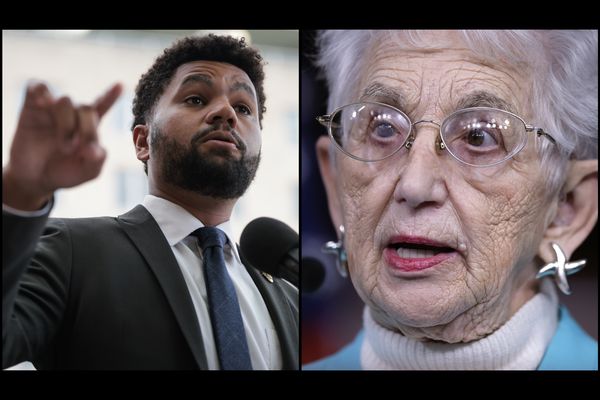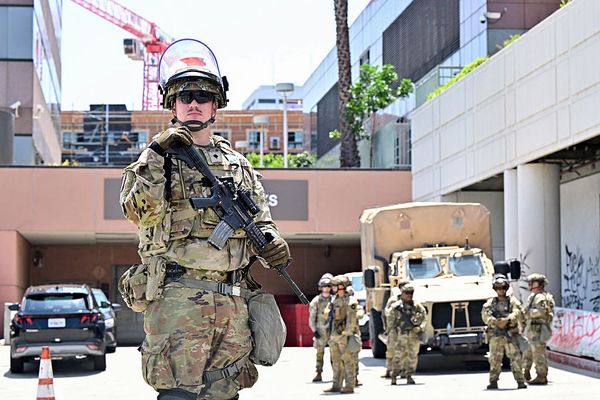
Last Sunday, trains from Tel Aviv were stuffed with people standing all the way to Jerusalem, practically stuck together by sweat. On arrival, mass chants of “De!Mo!Cra!Cy!” rang out through the train station. We were among the hundreds of thousands of giddy Israelis who swarmed the country with protests last weekend against legislation designed to suffocate judicial independence in Israel before a key vote last Monday.
But the return to Tel Aviv that Sunday night was different. It had been a long, hot day; the protesters were weary and a bit testy. Our train arrived at the tail end of a massive rightwing demonstration in Tel Aviv, with people who also flooded in from around the country and the West Bank, to support the government’s plans.
When the train doors opened, suddenly their crowd streamed on, nearly trapping ours. In the steaming Tel Aviv night, bitter opponents who had been shouting collectively at each other for seven months locked eyes and jostled for space. My imagination took the next step: someone got shoved, purposely or not. Someone cursed. Someone swung. Many Israelis pack weapons, especially in a crowd with many wearing the telltale clothing of radical West Bank settlers. Maybe this is how it starts, I thought – Israel’s civil war.
Israelis are riven by the unprecedented government programme to quash the judiciary and end constraints on executive power – which is nearly unrestrained already in Israel’s political system. Since January, infuriated citizens have been on the streets weekly and more, in dizzying numbers. They fear dictatorship and worry that their own lives, and their country, will become unrecognisable.
Supporters of the judicial overhaul – who, by all polls, are only a minority of the furthest rightwing Israelis – hope the government will now have unfettered power to annex the West Bank, expand settlements, deepen the hold of strict Jewish religious observance in Israeli life and reinstate corrupt politicians, especially one who had been ousted when the court ruled his appointment “extremely unreasonable” – the very legal reasoning that last week’s legislation will stifle.
The vote passed; furious protesters lit bonfires on highways and suffered police beatings or stinky water cannons. Israelis are divided at the best of times, but this feels far more dangerous.
I’m not optimistic, but I am sceptical that there will be a civil war. As a public opinion researcher, I’ve listened to people in many countries who were so divided that their nations seem paralysed. I hail from the US, where people murder each other arbitrarily at horrifying rates for a political principle; Americans see their second amendment as a God-given right to bear arms, but it’s actually a symbol that stands for irreconcilable worldviews. In the Netherlands, disputes over immigration brought down a government earlier this month. This isn’t just policy, it’s a profound conflict over identity and, for some, their existence. Profound, even zero-sum polarisation isn’t unique to Israel; we just need democratic institutions to contain conflict so it doesn’t become war.
Even incidents of violence don’t inevitably lead to civil conflict. In 2016, British MP Jo Cox was assassinated amid tensions caused by the imminent Brexit referendum. In 1970, Quebecer separatists kidnapped and strangled a provincial minister, leading Canada’s premier to invoke the War Measures Act and send troops to Quebec, but Canada did not descend into war – it became a global archetype of peace instead. Israel itself saw the assassination of Yitzhak Rabin, its prime minister, in 1995 and the country hung together.
What would happen if Israel’s government turned violently on its people, perhaps in response to some terrible event or provocation? It is alarming just to ask this question, but there are indications that Israel’s army wouldn’t turn on its citizens for the sake of this government. In an unprecedented development, more than 10,000 Israeli reservists have said they won’t serve if the judicial overhaul plans go through, prompted by just the first piece of legislation narrowing the use of an obscure legal doctrine most had hardly heard of before. But everyone understands an unconstrained executive power grab. It’s easy to imagine more reservists, at higher ranks, or even the government’s nightmare – soldiers in mandatory service – refusing to physically attack citizens.
But Israelis can’t let themselves be lulled into a false sense of normality – even without civil war, a dark future lies ahead. A better future is possible, but only if the extraordinary protest movement becomes a long-term, deep-thinking democracy movement. That movement cannot only look forward. Pro-democracy supporters will have to face uncomfortable truths about how undemocratic Israel has been for most of its history – from the military government that ruled its own Arab citizens in the first 20 years to the occupation authorities governing Palestinians which took over where the first military regime left off. These are just some examples of how Israelis have normalised warped practices, bending the meaning of democracy to suit their self-image.
But the government could also get its way, just as all 64 members voted for the legislation last Monday. Even wavering coalition lawmakers fell into line. Who needs dissent or independent thinkers in an autocracy?
What will change in that future? Israel will soon annex the West Bank and make its authoritarian military rule over Palestinians complete and permanent. Autocratic rule will slowly squeeze Israeli citizens, whose threats to flee are always exaggerated. Most will stay but lose their spark, as the government backs corruption and cronyism. Their fury at entrenched policies letting ultra-Orthodox Jews have all the funds and none of the responsibilities will be absorbed like a toxin as the vice-like grip on civil society, free expression and press tightens over time. The court won’t be able to help.
Like the people I’ve met and listened to in countries whose democratic potential is slipping away, some will remain defiant, but most will be despondent. Israel can take this route, but it will lose its soul.
Dahlia Scheindlin is a political strategist and a public opinion expert. She is also a policy fellow at the Century Foundation.







